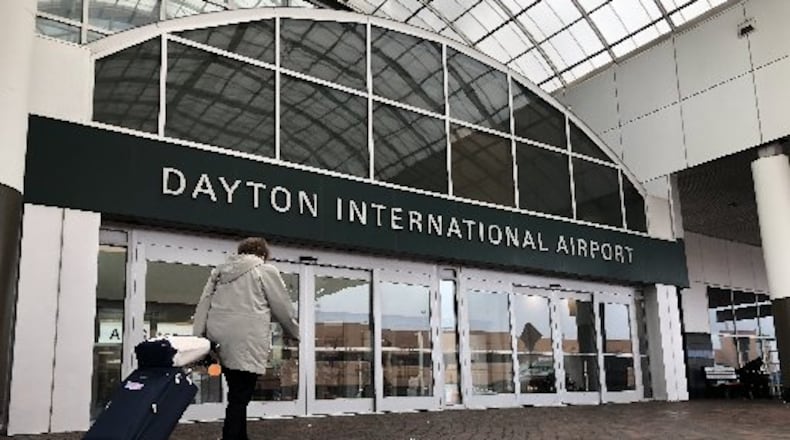Here are three things to know from the chamber’s robust list of focuses.
1. Chamber favors the H1-B & other high-skilled visas
The Dayton Area Chamber of Commerce said it will advocate for “federal agencies to increase the quota of skilled worker visas, higher education and other international visas allocated to Ohio.”
With it, the chamber is wading into a growing federal-level debate about so-called H1-B visas and the place foreign workers have — and should have — in the American economy.
H-1B visas were created in 1990 for people with a bachelor’s degree or higher in fields where jobs are deemed hard to fill, especially science, technology, engineering and math. While critics say they allow companies to pay lower wages with fewer labor protections, business advocates have maintained that the visa is necessary to subsidize a finite American-born labor force that’s often drawn to larger markets.
“I think when it comes to retaining some of that talent, particularly in the high skilled areas, we’re competing against other communities that may or may not have different quality of life amenities, that may or may not have some of those high paying hobs that those folks are looking for,” said Stephanie Keinath, vice president for strategic initiatives.
The chamber’s position is formed, in part, by high-skilled job vacancies across the Dayton region, which Keinath said span from nursing to defense jobs associated with Wright-Patt. She said there’s market of foreign-born, qualified workers who could fill those roles.
“There’s more than just one pool for us to draw from,” Keinath said.
President Donald Trump, who officially began his new term Monday, has recently indicated that he’s in favor of H1-B visas despite previously calling them “very bad” and “unfair” for U.S. workers.
2. Chamber is against ‘unreasonable’ tariffs
The chamber’s agenda says it will advocate to “maintain reasonable tariff policies to avoid increasing costs for business and consumers.”
While the chamber did not directly state what an unreasonable tariff policy would be, the broad policy stance comes as Trump, who has proposed a 60% tariff on goods from China and a tariff of up to 20% on everything else the United States imports, starts his new term.
Tariffs are essentially an import tax paid for by American companies (importers) and diverted to the U.S. Treasury. The costs are typically passed on to customers in the form of higher prices. On the other hand, tariffs can hurt foreign countries by making their products pricier and harder to sell abroad.
In his campaign, Trump argued that tariffs could be used to protect American interests, create more factory jobs and eventually lower prices for the American consumer.
As for the chamber? “We understand and businesses understand that tariffs are taxes,” said Keinath, who expressed concern about the effects high tariffs would have on the supply chain for Dayton-area manufacturers.
“The extent to which our companies in Dayton play on the international field, it really has the long term potential to impact their viability,” Keinath said. “Long story short: We understand that there are probably some tariffs that are necessary to make it easier for American companies to do what they do, and there are some tariffs, or some level of tariffs, that will ultimately make it cost prohibitive for American companies to succeed.”
3. Expanding Dayton International Airport a priority
Under its infrastructure and transportation priorities, the chamber said it will “advocate for expanded local, state and federal supports to improve and grow air service at the Dayton International Airport.”
Keinath said this priority stems from research the chamber has done on various regions comparable to Dayton. “Almost without exception, all of the communities we visited pointed to their airport as being a massive driver for economic development,” she said.
Local boardings at Dayton International Airport plummeted in 2020 and has not yet fully recovered. Dayton Daily News reporting found that the 621,400 “enplanements” in 2023 was a 30% reduction of the number of enplanements in pre-pandemic 2019.
For the chamber, the priority is to add to the dozen or so nonstop service routes currently offered by Dayton International and, in turn, get more people and companies to rely on a local airport instead of driving to Columbus or Cincinnati for air travel.
“The lack of availability of flights, and in some cases affordability of flights, really impacts the business community,” Keinath said. “We’re hearing from our big employers like Wright Patterson Air Force Base and CareSource — those companies that either have a national and some cases international presence — that robust air service at the airport is critical.”
Amanda Byers, the talent and policy director for the chamber, told this outlet that a more robust airport can also improve the market’s allure for companies and employees alike.
“The priority for us as a chamber is the business side is really for the ease of access for those companies and then the attractiveness, right? This is for companies to say, ‘Moving here allows you to still be able to access your family easily,’” Byers said.
The Associated Press contributed to this report.
For more stories like this, sign up for our Ohio Politics newsletter. It’s free, curated, and delivered straight to your inbox every Thursday evening.
Avery Kreemer can be reached at 614-981-1422, on X, via email, or you can drop him a comment/tip with the survey below.
About the Author

